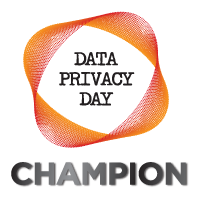
Blog Post
Ground Labs Named an Official Champion of Data Privacy Day
Ground Labs Named an Official Champion of Data Privacy Day
Best practices to bolster data privacy practices & how data discovery can help.
Occurring annually on January 28, Data Privacy Day is a global effort hosted by the National Cybersecurity Alliance to raise awareness on the importance of privacy and the protection of personal information. As a testament to our commitment to the cause, Ground Labs has registered as an official Champion of Data Privacy Day, supporting the principle that all organizations share the responsibility of being conscientious stewards of personal information.
This year’s Data Privacy Day theme encourages individuals to “Own Your Privacy” by learning more about how to protect the valuable data that is online, and encouraging businesses to “Respect Privacy,” which advocates for holding organizations responsible for keeping individuals’ personal information safe from unauthorized access and ensuring fair, relevant and legitimate data collection and processing.
“In recent years, we’ve seen the impact of more global awareness surrounding the abuse of consumer data, thanks to sweeping privacy measures like GDPR and CPRA,” said Kelvin Coleman, Executive Director, NCSA. “And while legislative backing is key to reinforcing accountability for poor data privacy practices, one major goal of Data Privacy Day is to build awareness among businesses about the benefits of an ethical approach to data privacy measures separate from legal boundaries.”
Best Practices: Bolstering Data Privacy Practices
The National Cyber Security Alliance has shared the following tips to help guide individuals and businesses to better data privacy practices, such as:
For Individuals:
-
- Personal info is like money: Value it. Protect it. Personal information, such as your purchase history, IP address, or location, has tremendous value to businesses – just like money. Make informed decisions about whether or not to share your data with certain businesses by considering the amount of personal information they are asking for, and weighing it against the benefits you may receive in return.
- Keep tabs on your apps. Many apps ask for access to personal information, such as your geographic location, contacts list and photo album, before you can use their services. Be thoughtful about who gets that information, and wary of apps that require access to information that is not required or relevant for the services they are offering. Delete unused apps on your internet-connect devices and keep others secure by performing updates.
- Manage your privacy settings. Check the privacy and security settings on web services and apps and set them to your comfort level for information sharing. Each device, application or browser you use will have different features to limit how and with whom you share information. Get started with NCSA’s Manage Your Privacy Settings page.
For Businesses:
-
- If you collect it, protect it. Data breaches can not only lead to great financial loss, but a loss in reputation and customer trust. Follow reasonable security measures to keep individuals’ personal information safe from inappropriate and unauthorized access. Make sure the personal data you collect is processed in a fair manner and only collected for relevant and legitimate purposes.
- Consider adopting a privacy framework. Build privacy into your business by researching and adopting a privacy framework to help you manage risk and create a culture of privacy in your organization.
- Conduct an assessment of your data collection practices. Understand which privacy laws and regulations apply to your business. Educate your employees of their and your organization’s obligations to protecting personal information.
- Transparency builds trust. Be open and honest about how you collect, use and share consumers’ personal information. Think about how the consumer may expect their data to be used and design settings to protect their information by default. Communicate clearly and concisely to the public what privacy means to your organization and the steps you take to achieve and maintain privacy.
- Maintain oversight of partners and vendors. If someone provides services on your behalf, you are also responsible for how they collect and use your consumers’ personal information.
Data Discovery: The First Step to Data Privacy
One of the first steps organizations should take in keeping personal information safe is to understand just where it resides. The growth of data is exponential, especially given the recent shift to remote business operations, and as a result, organizations may not have an accurate depiction of where all of its sensitive data resides. To get a better understanding of data collection, it’s critical for organizations to conduct a regular audit of data in possession, a process known as data discovery.
With Enterprise Recon by Ground Labs, organizations can find and remediate personal and sensitive information across the broadest range of structured and unstructured data, whether it’s stored on servers, employees’ devices or in the cloud. Enterprise Recon enables organizations worldwide to seamlessly discover all of their data and comply with GDPR, PCI DSS, CCPA, HIPAA, Australian Privacy and other data security standards that require the ability to locate and secure PII data as well as information on gender, ethnicity and health.
For more information on how your organization can get started with data discovery, please book a demo with one of our experts today.
Read more on Data Privacy Day 2021 by visiting https://staysafeonline.org/data-privacy-day/.
